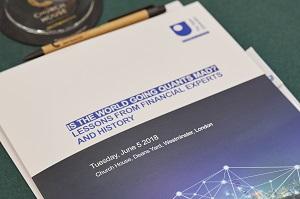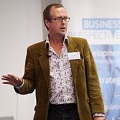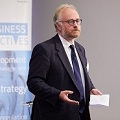Financial experts fire up the crowd at evening lecture in London

An unscheduled fire alarm which fortunately proved to be a false alarm could not dampen the spirits of the audience at a financial lecture organised by The Open University Business School (OUBS). A decade after the global financial markets went into meltdown, our academics were joined by other invited experts to discuss the current precarious situation in ‘Is the world going quants mad? Lessons from financial experts and history’ on Tuesday 5 June.
The interruption to the panel discussion at the stunning Church House venue, in the shadow of Westminster Abbey, caused the building to be evacuated before the all-clear was signalled. This understandable sense of caution, in the wake of the Grenfell Tower disaster and coming fewer than 24 hours before a huge blaze at the Mandarin Oriental hotel in Knightsbridge, is something which has been sadly lacking in the world’s financial markets in modern times, a theme which was explored by keynote speakers Dr Paul Wilmott and Professor Russell Napier.
Mathematician and business owner Paul described becoming a quantitative analyst, commonly referred to as a ‘quant’ (someone who uses complex mathematical and statistical modelling), in the mid-1980s when it was still an unfashionable occupation. He aired his thoughts in ‘Imagination is more important than knowledge: street smarts vs book learning in financial markets’.

The perfect background for an economist is to have run a corner shop as they will understand human beings and possess real-world experience. There’s a difference between value and price, and the man in the corner shop knows this. There are problems at every level in the financial markets due to computer algorithms, high-frequency trading and the very nature of incentives in the sector. The trouble is that professors don’t understand the markets; while traders don’t understand the models created by these academics. In summary, we need more street smarts and less book learning.
Dr Paul Wilmott
Researcher, Consultant and Lecturer in Quantitative Finance
Russell, who actually worked in his father’s corner (butcher’s) shop growing up, was also critical in ‘What cannot be counted still counts: why an understanding of financial history is crucial for investors’.

“The world debt-to-GDP ratio is at a record high and the system is more fragile than it has ever been. People are making far too much money out of the status quo, however, and only a lack of liquidity in the market will change things. It’s going to need something even bigger than 2008 (and the global financial crisis) to change things.
“We really need to learn from the past, and appreciate that technology, science, politics and sociology are all important factors in how markets behave. ‘Risk’ and ‘uncertainty’ are different things – risk is something that is capable of mathematical computation but is uncertainty? Human beings hate uncertainty and this applies in finance or politics. Humans really struggle with uncertainty but not as much as machines; they’re very good at calculating risk and the roll of a dice but how would they cope with communism, capital controls or populism, or technology which is the cause of the greatest uncertainty?”
Professor Russell Napier
Co-founder of the investment research portal ERIC (Electronic Research Interchange)
The event was led by Dr Michael Oliver, Senior Lecturer in Finance, OUBS, who also sat on the panel discussion which was facilitated by Liz Moody, Senior Lecturer, Executive Education, OUBS. Michael said that economic and financial history was an essential part of the MSc in Finance at OUBS.
A family emergency meant Dutchman Marco de Pater was unfortunately unable to pick up his MSc in Finance Student of the Year Award 2017, which was presented at the event by Janette Rutterford, Professor of Personal Finance Capability, OUBS.
To watch videos from the event, please click to visit the YouTube playlist.

Upcoming Events
Doing Academia Differently: Professional Development Symposium for Doctoral Students and Early-Career Academics
Tuesday, March 10, 2026 - 09:00 to 17:00
Michael Young Building, The Open University, Walton Hall, Milton Keynes, MK7 6BB
This one-day symposium on ‘Doing Academia Differently’ will provide inspiration and support for PhD and early-career academics to approach the complex tensions and dilemmas of contemporary academia in new and creative ways.
Caring Feminisms Across Borders Conference
Wednesday, September 2, 2026 - 09:00 to Friday, September 4, 2026 - 17:00
University of Donja Gorica, Oktoih 1, Podgorica 81000, Montenegro
This academic conference hopes to draw feminist scholars, activists and communities together to consider what caring feminism across borders might mean now and for the future.